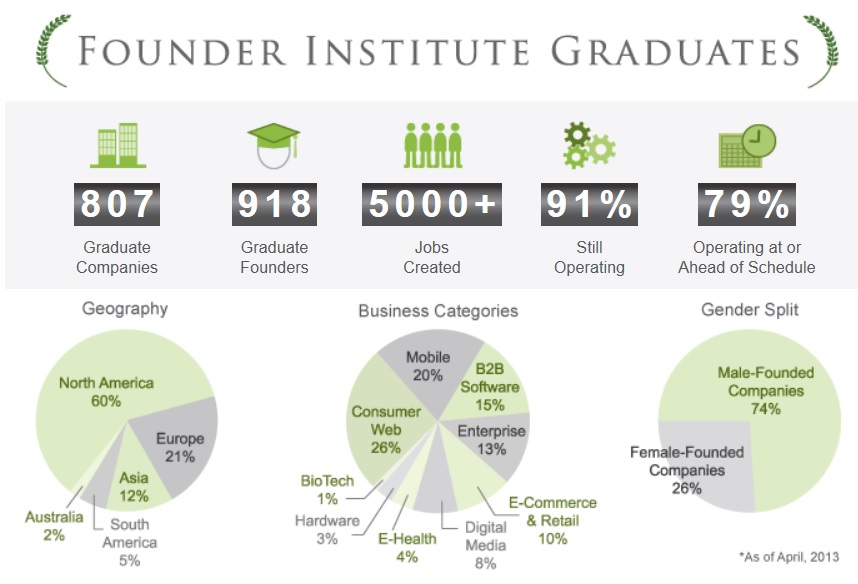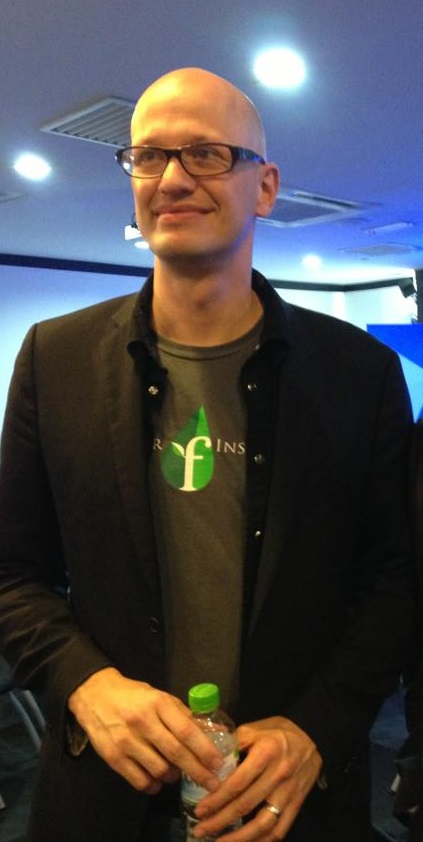Founder Institute’s Ressi on entrepreneurs and personality flaws
By A. Asohan May 16, 2013
- Accelerator bets on entrepreneurs, rather than just their ideas and business plans
- Aptitude test is 86% accurate, looks at not only positive traits but also personality defects

‘I NEVER trust my intuition, by the way … my intuition is always wrong,” says Adeo Ressi, chief executive officer of the Founder Institute, the early-stage startup accelerator and global launch network which has ‘Globalising Silicon Valley’ as its motto.
It’s an unusual stand – or confession – for anyone in the startup scene to make, but perhaps pretty much in keeping with the Founder Institute’s tendency to buck the trend. While other accelerators talk about disruptive ideas and solid business plans, Ressi’s outfit looks at the entrepreneurs first and foremost.
The idea is that it’s the entrepreneurs themselves who drive the business, and good ones can always come up with more ideas even if their first ventures stumble or fail. They get back up, brush the dust off and throw themselves back in the fray, having learned new lessons, undergone new experiences, and gained valuable insights.
 Atypical, but nobody can argue with the Founder Institute’s record: It has ‘graduated’ 750 companies which themselves have a more than 90% success rate (only 9% fail in the first 18 months), with 40% getting funding within six months of graduating. New Founder Institute chapters are popping up all over the world (click chart to enlarge).
Atypical, but nobody can argue with the Founder Institute’s record: It has ‘graduated’ 750 companies which themselves have a more than 90% success rate (only 9% fail in the first 18 months), with 40% getting funding within six months of graduating. New Founder Institute chapters are popping up all over the world (click chart to enlarge).
Ressie was in Kuala Lumpur last month as part of a whirlwind tour of its chapters in the region. “I flew in from Jakarta, having already visited Sydney and Singapore. I will probably have to skip Perth and Vietnam (where the Institute has chapters in Hanoi and Ho Chi Minh City). I’ve already met 200 entrepreneurs this trip alone,” he says with only the slightest hint of exhaustion.
“We’re also opening in Bangkok and Manila, plus an additional city in Australia … either Brisbane or Melbourne,” he says in an interview with Digital News Asia (DNA), a couple of hours before he joined members of the Technopreneurs Association of Malaysia (TeAM) for a ‘fireside chat.’
So how many cities is the Founder Institute present in? Ressi pauses to calculate. “It’s a definitional thing: We have signed an agreement with the directors in Thailand, but haven’t technically opened our chapter there yet.
“If you count all the cities where we have agreements in place, then it’s about 52 to 53; if you count chapters like the one in Kuala Lumpur which are already physically operating, it’s about 46 to 48 cities,” he says.
 Personality defects and red flags
Personality defects and red flags
Ressi’s quip about intuition came off the back of a discussion we were having about how one goes about determining if an entrepreneur is good enough.
In this respect, the Founder Institute does not depend on mere judgement calls, but actually has a robust test it performs: The famous (or infamous, depending on your point of view) aptitude test it calls the Predictive Admissions Test.
When asked what kind of people the Founder Institute looks for, Ressi (pic, courtesy of TeAM) doesn’t immediately rattle off a standard, PR-approved and -massaged answer. The 6’ 5” CEO thinks about it, as he does with many questions, as if his mind is parsing many streams of thought to dredge up facts and actual data.
He then builds his case. “We process about 1,000 to 1,500 applications a month, and we have a very small staff, so we have to do this very quickly,” he says, snapping his fingers to drive home his point. “There are really two things we look for.”
The first is of course the test, which Ressi says can predict how well applicants would do as entrepreneurs. It looks at ‘positive’ traits like fluid intelligence and agreeable personalities, and there is a minimum score threshold that the Institute sticks to.
“We also look for a variety of personality defects that we want to avoid,” he says. “Examples include predatory aggression, pathological deceit, emotional instability, narcissism and permanent sadness – there are about 20 of [these traits that are measured], and some of them are worse than others.”
“We have a red, orange and yellow flagging system,” he continues, pausing to add, “You know, I’ve never really told anyone else about this.”
The Institute almost never lets in a ‘red flag,’ except perhaps to prove to the director of a local chapter that his or her assessment of a candidate was inaccurate.
“The ‘orange flag’ people have personality issues that are less severe but are things we should be aware of, and the yellow flags are generally fine. Narcissism is a yellow flag, for example,” says Ressi. “Anytime the score is on the lower side and the candidate has an orange or yellow flag, they will undergo a more rigorous review.”
Scoring is on a 1-5 scale. The initial aptitude test collects about 30 data points – by the time an entrepreneur completes a ‘semester,’ the Founder Institute would have collected anything from 60 to 70, and sometimes even 90, data points to gauge the quality of an entrepreneur.
“The aptitude test is 86% accurate … it is frighteningly accurate,” says Ressi as he proceeds to show DNA some examples. The variance between an entrepreneur’s aptitude score and his performance in a Founder Institute programme gets less and less as the programme proceeds – a 2.83 versus 2.94, for example.
“Midway through the programme is when you see the tightest correlation, and the test will predict 86% either exactly right or with a very low variance,” says Ressi. “Successful entrepreneurs tend to score on the high 2s to 3s.”
Young whippersnappers
The test is just one part. The Founder Institute also looks at the candidate’s background and the thoroughness of his application.
“If someone is just out of school and he puts only a couple of sentences in each answer – it’s a weak background and he hasn’t really put any effort in,” says Ressi. “That’s a bad sign, and no matter what the scoring is, we almost never let these through.”
But wait a minute – isn’t entrepreneurship a young person’s game? Is just getting out of school a deal-breaker?
“Not really,” Ressi concedes. “We let anyone [with the right aptitude] in – we do not judge based on age, gender or race.”
“But with that said, if you’re really young (23 or below) or really old (60 or above), we take a closer look. Not that we don’t want to let you in, but the programme is relatively hard and requires a certain level of intellectual capability.
“We find that to get through the programme when you’re over 60 is challenging; and when you’re really young, you may not have had the practical life experience to be successful,” he says. “But we genuinely don’t have any age barriers.”
Which brings us back to Ressi and his intuition, or lack thereof. The robust tests and processes that the Founder Institute insists on comes from the fact that its CEO knows he is fallible. He even admits that one of its most successful graduate companies is run by a young lady whom he never expected to be successful.
“And that’s the problem, by the way, about the world today – most of the decisions are being made by people betting on their intuition,” he says. “I respect them, but that’s not the way I would do it.”
“The Founder Institute bets on people, and if we thought there was a better way, we would use it. We all have biases, whether you like it or not, and this we’re going to get it wrong sometimes – so we do everything we can to eliminate bias in the Founder Institute,” he adds.
Coming up next: The promise of Malaysia’s startup scene and the problem with ecosystems
Related Stories:
Where ideas don’t count; not at first anyway
Founder Institute breaks ground in Malaysia
For more technology news and the latest updates, follow @dnewsasia on Twitter or Like us on Facebook.


